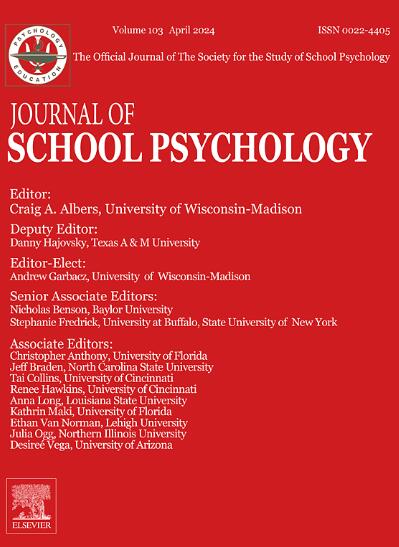A healthy context, a just context? The role of classroom-level victimization in the adverse effects of bullying victimization on students' belief in a just world
IF 4.1
1区 心理学
Q1 PSYCHOLOGY, SOCIAL
引用次数: 0
Abstract
The phenomenon that victims of bullying experience greater psychological problems in environments with lower levels of victimization is known as the healthy context paradox. The current study investigated the healthy context paradox with respect to students' belief in a just world. Specifically, we examined prospective effects of bullying victimization on personal and general belief in a just world, while taking the classroom level of victimization into account. Based on self-reports from 2010 Finnish 4th to 9th grade students (50.9 % girls, Mage = 12.6, SD = 1.71), multilevel models revealed negative prospective associations between bullying victimization and both types of belief in a just world. In addition, classrooms with initially lower levels of victimization subsequently showed higher levels in both types of belief in a just world. Finally, the adverse effects of bullying victimization on both types of belief in a just world were stronger in classrooms with lower levels of victimization. Our results support and extend the healthy context paradox. Implications, particularly for prevention and intervention strategies are discussed.
一个健康的环境,一个公正的环境?课堂受害在欺凌受害对学生公正世界信念的不利影响中的作用
欺凌受害者在受害程度较低的环境中经历更大的心理问题,这一现象被称为健康环境悖论。本研究探讨了健康情境悖论与学生对公正世界信念的关系。具体地说,我们考察了欺凌受害对个人和对公正世界的普遍信念的预期影响,同时将课堂层面的受害考虑在内。基于2010年芬兰四至九年级学生(50.9%女生,Mage = 12.6, SD = 1.71)的自我报告,多层次模型揭示了欺凌受害与两种公正世界信念之间的负相关。此外,最初受害程度较低的教室随后显示出对公正世界的两种信念水平较高。最后,欺凌受害对两种公正世界信念的负面影响在受害程度较低的教室中更为强烈。我们的研究结果支持并扩展了健康环境悖论。讨论了其影响,特别是对预防和干预策略的影响。
本文章由计算机程序翻译,如有差异,请以英文原文为准。
求助全文
约1分钟内获得全文
求助全文
来源期刊

Journal of School Psychology
PSYCHOLOGY, EDUCATIONAL-
CiteScore
6.70
自引率
8.00%
发文量
71
期刊介绍:
The Journal of School Psychology publishes original empirical articles and critical reviews of the literature on research and practices relevant to psychological and behavioral processes in school settings. JSP presents research on intervention mechanisms and approaches; schooling effects on the development of social, cognitive, mental-health, and achievement-related outcomes; assessment; and consultation. Submissions from a variety of disciplines are encouraged. All manuscripts are read by the Editor and one or more editorial consultants with the intent of providing appropriate and constructive written reviews.
 求助内容:
求助内容: 应助结果提醒方式:
应助结果提醒方式:


